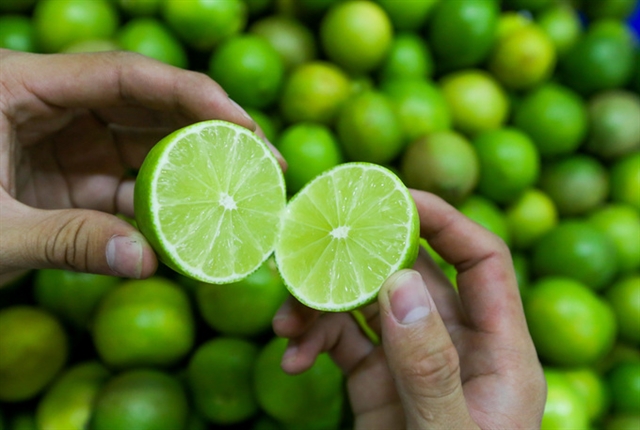
LONG AN — Seedless lemon farming has been thriving in Bến Lức District in the southern province of Long An, replacing ineffective sugarcane farming.
About eight years ago, the district was known as a land of sugarcane with a total sugarcane growing area reaching 8,000-9,000 hectares.
However, as the price of local sugarcane continued to drop for the last few years, farmers struggled to find output for their products.
By the season 2020-2021, only 60 hectares of sugarcane left in the province, said Nguyễn Chí Thiện, vice director of the province’s Agriculture and Rural Development Department.
“Farmers have been shifting to grow lemons,” he said.
According to the Bến Lức District’s Agriculture Department, the district now has more than 7,100 hectares of lemon, and of that about 6,600 hectares is for seedless lemons.
Nguyễn Văn Trung, a farmer in Thạnh Hòa Commune, Bến Lức District said that thanks to lemon farming, farmers in remote communes like Thạnh Hòa, Thạnh Lợi changed their lives, becoming well-off and having money to build big houses.
On average, a hectare of lemon could generate a profit of nearly VNĐ100 -150 million per year.
Nguyễn Thị Hải, owner of a 2-hectare lemon farm in Thạnh Lợi Commune said that local farmers now applied hi-tech and national/international standards in lemon farming.
Their lemons now met requirements for export to the EU, she said.
Lê Văn Nam, head of Bến Lức District’s Agriculture and Rural Development, said that the Government had offered support to promote lemon farming models including seedling and irrigation system.
If the models were operated effectively, about 200 hectares of lemon could meet requirements to export lemons to the EU, he said.
Nam said that to support the lemon production area in the district to bring higher value, Long An Province planned to more support policies such as granting planting area codes, geographical indications, and improving infrastructure in lemon areas for production.
Bến Lức District proposed the province consider a plan to support farmers to cope with climate change in the long term.
The district also urged for more investment for irrigation and water supply works and called for businesses to invest in post-harvest processing of lemons, adding higher value to farmers.
Last year, Long An Province also added lemon trees to the list of high-tech crops besides vegetables, dragon fruit and rice.
Nam said that the district was striving to apply high technology on an additional 1,500 hectares of lemon by 2025, bringing the total area of lemon growing under this model in the district to 2,700 hectares.
Trần Duy Thuận, director of Ben Luc Agricultural Service Cooperative in Luong Hoa Commune, Ben Luc District, said that in the past, farmers in the heavily alkaline soil of Ben Luc district had to tie their production to sugarcane, regardless of price fluctuations or threats from pests and diseases. They hardly had any alternative crops.
However, now, a large area has been used to grow seedless lemons.
Thuận said that after days of promoting mechanisation for local farmers, he learned a lot from their experiences in farming, as well as growing seedless lemons.
Since then, he has been determined to establish a cooperative with farmers to invest in high-tech lemon cultivation.
“When I started farming, many friends and even my family members warned me about risks that I could face. However, I was very confident to invest in farming, especially when mechanisation was applied in production, from tending, harvesting to processing for export,” he said.
Thuận said that hi-tech agriculture did not mean investment in building large and modern greenhouses and net houses. It was about the process to get high-quality yields and ensure product traceability including where the breed comes from, how to care, what fertiliser to use and what medicine to use.
Thuận’s cooperative applied technological advances in all production stages such as watering, fertilising and making soil so the cooperative needed very few workers.
“To cope with drought and salinity, the cooperative used motorised machines to transport thousands of litres of water to the fields and put a foliar spray fertilizer system at night to help lemons achieve high productivity and efficiency. When harvesting, instead of each farmer having to carry each 50 kg bag of lemons, the cooperative applies mechanisation, bringing the vehicle to the field, just one person can operate and transport dozens of tons of lemons,” he said.
Before applying mechanisation in production, he had to calculate, re-plan the entire field, introduce a closed process from tillage to planting and tending and harvesting conveniently.
Currently, the cooperative has built a supply-demand connection model to stabilise product consumption, and improve preliminary processing and processing technology.
The cooperative also has a high-quality raw lemon area meeting GlobalGAP standards. — VnExpress News
- Reduce Hair Loss with PURA D’OR Gold Label Shampoo
- Castor Oil Has Made a “Huge” Difference With Hair and Brow Growth
- Excessive hair loss in men: Signs of illness that cannot be subjective
- Dịch Vụ SEO Website ở Los Angeles, CA: đưa trang web doanh nghiệp bạn lên top Google
- Nails Salon Sierra Madre
 VnExpress News The News Gateway of Vietnam
VnExpress News The News Gateway of Vietnam





